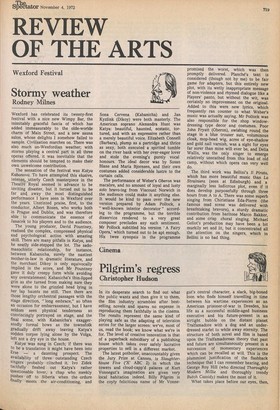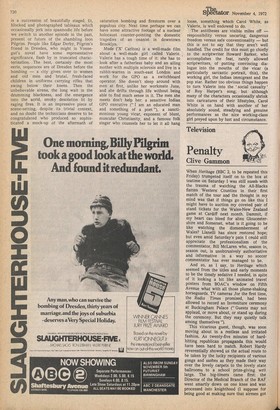Cinema
Pilgrim's regress
Christopher Hudson
In its desperate search to find out what the public wants and then give it to them, the film industry scrambles after bestselling novels and spares no expense in reproducing them faithfully in the cinema. The results represent the same kind of playing safe as the adapting of television series for the larger screen: we've, most of us, read the book; we know what we're in for. The level of creative innovation is that of a paperback subsidiary of a publishing house which takes over safely lucrative properties to sell in a different market.
The latest potboiler, unaccountably given the Jury Prize at Cannes, is Slaughterhouse Five ('X' ABC 2) in which the towers and cloud-capp'd palaces of Kurt Vonnegut's imagination are given very local habitation indeed. Billy Pilgrim is the coyly felicitious name of Mr Vonne gut's central character, a slack, big-boned loon who finds himself travelling in time between his wartime experiences as an American prisoner-of-war in Dresden, his life as a successful middle-aged business executive and his future-present in an airtight bubble on the distant planet Tralfamadore with a dog and an underdressed starlet to while away eternity. The structure of both novel and film is based upon the Tralfamadorean theory that past and future are simultaneously present in a succession of momentary experiences which can be recalled at will. This is the plummiest justification of the flashback technique that I can remember hearing, and George Roy Hill (who directed Thoroughly Modern Millie and thoroughly trendy Butch Cassidy) makes the most of it.
What takes place before our eyes, then, is a succession of beautifully staged, lit, blocked and photographed tableaux which occasionally jerk into spasmodic life before we switch to another episode in the past, present or future of the shambling loon Pilgrim. People like Edgar Derby, Pilgrim's friend in Dresden, who might in Vonnegut's novel have some representative significance, flash by in truncated characterisation. The best, certainly the most eerie, sequences are of Dresden before the bombing — a city given over to women and old men and brutal, fresh-faced children in uniforms carrying rifles that swing below their knees. Then the unbelievable sirens, the long wait in the drumming blackness, and the emergence into the acrid, smoky desolation lit by raging fires. It is an impressive piece of scene-setting, despite its trivial context, and no doubt the technicians deserve to be congratulated who produced so sophisticated a mock-up of the aftermath of saturation bombing and firestorm over a populous city. Next time perhaps we can have some attractive footage of a nuclear holocaust counter-pointing the domestic tragedies of an onanist in downtown Brooklyn.
Made ('X' Carlton) is a well-made film about a well-made girl called Valerie. Valerie has a tough time of it: she has to look after a fatherless baby and an ailing mother with multiple sclerosis and live in a rabbit-warren in south-east London and work for the GPO as a switchboard operator. She doesn't sleep around with men at first, unlike her workmate June, and she drifts through life without being able to find much sense in it. The men she meets don't help her: a sensitive Indian GPO executive ("1 am an educated man and something of a poet "), a sanctimonious young vicar, exponent of blunt, muscular Christianity, and a famous folk singer who counsels her to let it all hang loose, something which Carol White, as Valerie, is well endowed to do.
The antitheses are visible miles off — responsibility versus uncaring, dangerous freedom versus safe conventionality — but this is not to say that they aren't well handled. The credit for this must go chiefly to the scriptwriter Howard Barker, who accomplishes the feat, rarely allowed scriptwriters, of putting convincing dialogue into the mouths of the vicar (a particularly sarcastic portrait, this), the working girl, the Indian immigrant and the pop star. Rather too obvious things happen to turn Valerie into the ' social casualty' of Roy Harper's song; but although many of the characters occasionally shrink into caricatures of their lifestyles, Carol White is on hand with another of her absolutely sound, steadying and genuine performances as the nice working-class girl preyed upon by lust and circumstance.









































 Previous page
Previous page